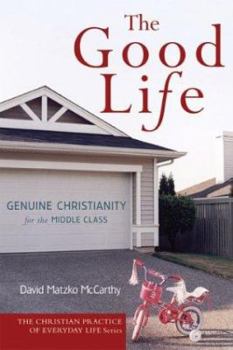The Good Life: Genuine Christianity for the Middle Class
Select Format
Select Condition 
Book Overview
McCarthy is a masterful writer with an astute eye for the encapsulating anecdotes of our everyday lives. Digging in the garden of consumerist America, his spade roots out many economic and romantic... This description may be from another edition of this product.
Format:Paperback
Language:English
ISBN:1587430681
ISBN13:9781587430688
Release Date:January 2004
Publisher:Brazos Press
Length:176 Pages
Weight:0.65 lbs.
Dimensions:0.6" x 6.0" x 9.0"
Related Subjects
Christian Books & Bibles Christian Living Religion Religion & Spirituality TheologyCustomer Reviews
3 ratings
a kick in the pants
Published by Thriftbooks.com User , 19 years ago
Getting married this summer, The Good Life has been a great book to guide conversations with my wife about what our life and ministry together might look like. I am naturally cynical about much of the contemporary church and despise shallow "how to" spirituality books (which i think "stinki" was looking for in review below) so McCarthy's critical but fair assessments were valuable. McCarthy will likely challenge most Christians at some point...whether it is with their inwardly turned homes versus hospitality, capitualations of faith for patriotism, and the constant immersion in a consumerist economy.
www.wordsntone.com
Published by Thriftbooks.com User , 20 years ago
Politicians target the "middle-class" for their votes. Businesses and entrepreneurs see the "middle-class" as a market niche. The vase majority of churches throughout the US seem to appeal mainly to those in the middle-class component of the population. Some critics of middle class Christians have argued that they essentially prefer the status quo (like their unchurched and non-christian neighbors) and do not have, as a social group, the capacity to make significant contributions, and as a result, some could add meaningful contributions to the mission of the church. The Good Life will move middle-class Christian readers beyond their attachment to the market-share of business and past their complicit relationship to the consumerism mentality within American culture. David McCarthy seeks to help the middle-class to be more than a target of market-economics and political rhetoric. He applies biblical principles to help those in this particular class of people to respond to Jesus' mandate to seek first the kingdom of God. McCarthy argues that middle-class Christians have a misguided attachment to the world. He maintains the Christian life should require less "stuff." This book offers guidance to the middle-class Christian community whose relationships to people, family, home, neighborhoods, work, and even to the earth, are determined more by the market economy than by Christian principles. As American Christians it is difficult to not be caught up in American's cultural, political, and economic benefits. Harder still to not be defined by them or to seek meaning through them. The Good Life will help the reader to live beyond all this and discover ways to "seek the Kingdom of God." I recommend that middle-class churches and their leadership ought to consider McCarthy's book as a guide for mission development, even a framework for a Sunday morning sermon series. Church small groups would benefit from reading it together.
Kingdom ethics in a commercial work
Published by Thriftbooks.com User , 20 years ago
Wonderfully written, and sharply packaged by Brazos (Baker). McCarthy is a theo. prof. at a Catholic college in Maryland, probably in his late-30s. He uses everyday anecdotes to expose the struggle middle-class suburban Christians are in, often without knowing it. The book is 27 small chapters broken into 4 categories: People (friendship, marriage, sex and singleness, God and neighbor, etc.), Places (home and hospitality, country and nation, etc.); Things (debts, work); and God (breaking down the elements of the Apostle's Creed). James K. A. Smith of Calvin College writes in a blurb on the back cover: "How can we resist the empire's demand for our allegiance? This remains a fundamental question for Christain discipleship, and in The Good Life, McCarthy poses it afresh. But now the empire is not Rome but the market, and the arena of challenge is not the colliseum but Wal-Mart. He offers challenging wisdom to those of us in minivans who are trying to discern what God's disruptive grace means for our friendships, our neighborhoods, and our consumer habits." Another blurb: "Don't let the charm of his style or his mastery of the telling detail mislead you. McCarthy's The Good Life is both a sustained critique of the consumerism that enslaves and a profound account of how God's graciousness can set us free. This is theology at its best. A how to book about something that matters." My biggest dissapointment with the book -- it does not emphasize strongly enough the centrality of the Church. Chap. 25 on the "One, Holy, Apostolic Church," was very insightful. But any study of Christian ethics needs to communicate clearly to our individualist culture -- the Church is not one means to the end, it IS the end. The Church isn't a tool for the individual Christain to use for their personal growth, it is the object of the Christian life. The Gospel is not Christ. It is Christ and his Church. McCarthy may understand that, and certainly has plenty of Gospel-driven things to say about the centrality of community, but I didn't think that point was made clearly enough. Also, a good index would have helped. I have not read this cover to cover yet, but found myself flipping back and forth. I may have missed things. But I didn't see anything on the role of the Lord's Supper in discipleship (funny for a Presbyterian to be criticizing a Catholic for that!). Overall, one of the best things I have read on the topic. I'm going to buy more copies for friends and parishoners.






